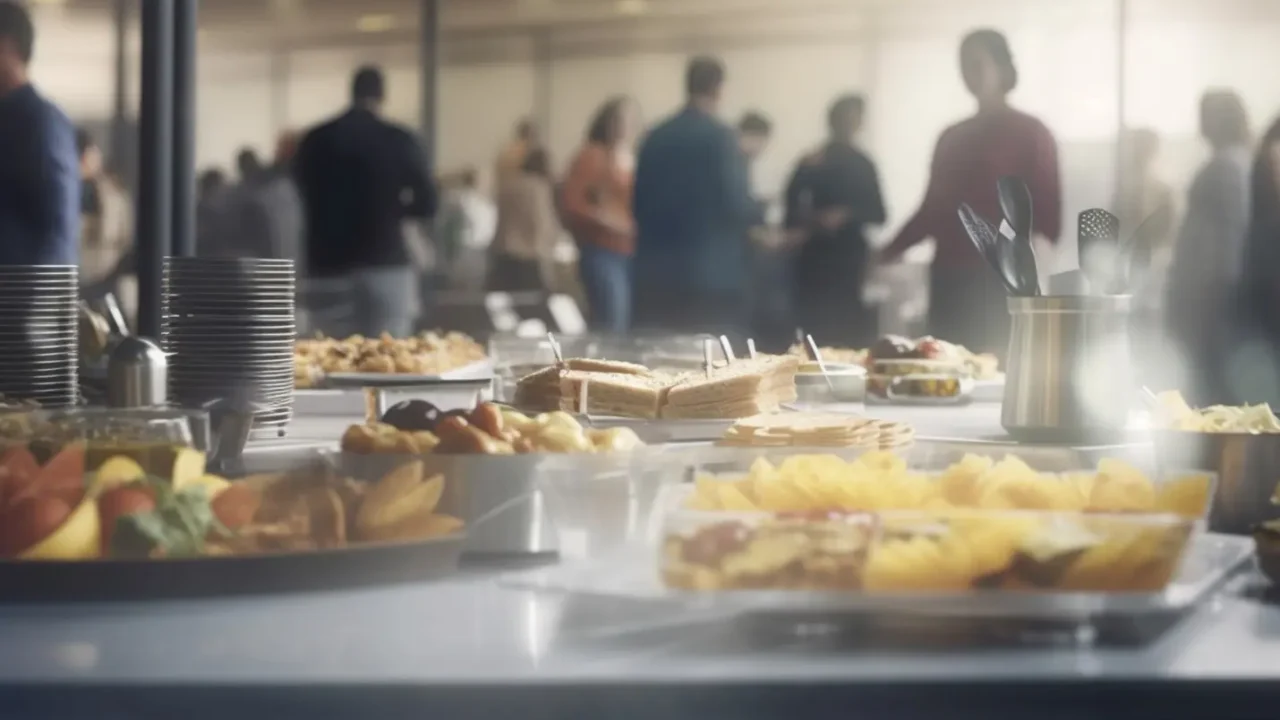Planning an event is always an exciting experience, but it can be quite a costly one, too. Did you know that food and beverage (F&B) expenses are among the most significant expenses associated with any event? Yes, from corporate conferences to trade shows, the cost of catering can quickly add up and exceed your budget.
Recent studies also show that businesses are cutting down on event budgets with the rising costs of inflation, with catering expenses being one of the first areas to be slashed. Therefore, it is essential to find creative ways to reduce F&B expenses without sacrificing the quality of your event.
We’re here to help you plan a memorable event without worrying about skyrocketing costs. So, sit back, relax, and read on to discover how to save some serious dough on your next event’s F&B budget.
Create a Detailed Budget
Okay, so you’ve set a budget for your event – fantastic! Now, let’s talk about why allocating a specific percentage to F&B is essential.
First and foremost, food and beverage are some of the most memorable aspects of any event. Imagine attending an event where the food is subpar, compared to another where it’s delicious – which would you remember more? Odds are, it’s the latter.
Additionally, when you allocate a percentage of your budget specifically for F&B, you can make more informed decisions when planning the rest of the event. For example, if your F&B budget is limited; you may skip the extravagant decorations and focus on making the food and drinks exceptional.
Now, let’s talk about tracking expenses regularly to ensure no significant discrepancies. This is crucial because F&B costs can add up quickly. This includes the cost of the food and drink and any additional fees such as service charges, gratuities, and taxes. If you’re not careful, you could blow your budget before the event begins. By tracking expenses regularly, you’ll be able to catch any overspending early on and adjust as needed.
Jenn Charron, COO of the National Home Infusion Association also recommends being diligent in tracking year-over-year guarantees to watch for any trends. This will help avoid any unnecessary surprises.
In summary, allocating a specific percentage of your budget to F&B and tracking expenses regularly are essential steps when planning any event. Not only will this help you stick to your budget, but it will also ensure that your guests have a memorable culinary experience.
Negotiate with Vendors
While some venues require in-house catering services, let’s dive a bit deeper into the crucial role of negotiating with vendors regarding managing food and beverage expenses. In today’s business landscape, events and corporate gatherings of all sorts are becoming increasingly prevalent – and with them, the need for catering services.
While settling for the first vendor you find might be tempting, taking some time to shop around can yield tremendous benefits in the long run. Getting quotes from multiple vendors allows for price comparison and enables you to evaluate quality differences, ask about potential risks or issues, and – most importantly – negotiate better rates.
Negotiating is recommended and should be seen as a crucial aspect of your event planning strategy. Remember that pricing is rarely set in stone – vendors are keen to make sales and expand their clientele and will likely be open to discussing discounts and incentives.
Kara Dao, CEO JDC Events, reiterates that requesting multiple quotes and comparing pricing, menus, and services is extremely important.
“Use this information to negotiate better deals, such as discounted prices, package upgrades, or waived service charges,” Dao explains. “Don’t hesitate to ask for a line-item breakdown of costs to identify areas where you can save.”
Furthermore, your negotiation skills can be used to leverage relationships and contracts. For instance, planning multiple events per year might be worth considering preferred vendor agreements or looking for economies of scale that could help reduce expenses.
Finally, don’t hesitate to ask for references or testimonials from previous clients. This can give you a sense of a vendor’s reliability, quality of service, and potential for future collaboration.
Negotiating with vendors is essential to managing F&B expenses without sacrificing quality. So, next time you plan an event, take the time to shop around, compare quotes, and negotiate the best possible deal!
Consider Limited Menus
When we say, “limited menus,” it doesn’t necessarily mean offering only a few basic options. Instead, it means sacrificing a well-curated selection that balances variety and practicality. Too many choices can overwhelm guests and lead to overstocking, resulting in wastage and increased expenses. With the rise of food costs, plated meals are often more affordable since the venue can control their food costs since buffets overstock since self-serving tends to lead to more consumption.
On the other hand, having too few options can also be problematic, as attendees may need help finding something they like. Therefore, a limited menu strategy should include diverse dishes catering to different tastes and dietary requirements. For instance, if you’re organizing a corporate event, it’s essential to consider including vegetarian, gluten-free, and dairy-free options.
Another benefit of limited menus is that they make controlling the budget more manageable. Having a set number of dishes makes it easier to estimate the required ingredients and plan accordingly. This way, you don’t spend more than necessary on inventory.
One helpful tactic is providing attendees with a menu ahead of time. This enables them to choose their preferred options, simplifying the planning process and reducing the likelihood of over-ordering. Besides, it also demonstrates a considerate approach to your attendees, enhancing their overall experience.
Dao also suggests optimizing beverage options. For example, she says instead of an open bar, considers offering a limited selection of wine, beer, and signature cocktails.
“You can also explore options like drink tickets or a cash bar to control costs, “Dao adds. “Negotiate with your caterer or beverage supplier to get the best prices on bulk orders.”
In conclusion, implementing limited menus is a smart and practical way to manage inventory, reduce wastage, and control costs. So, next time you’re organizing an event, consider a limited menu strategy to ensure a successful and satisfying experience for everyone.
Don’t Forget the Timing
When it comes to organizing events, timing is everything! The timing of your event can significantly impact your F&B costs, so it’s essential to plan your schedule and program carefully. You can reduce your F&B expenses by strategically scheduling your event without sacrificing attendee satisfaction.
One effective tactic for minimizing F&B expenses is to host your event during “off-hours.” For example, if you’re planning a seminar or workshop, consider scheduling it outside of traditional mealtimes (i.e., breakfast, lunch, and dinner). By avoiding mealtimes, you can minimize the food and drink you need to provide your attendees, which can translate to significant cost savings.
Another option is to time your meals and snacks throughout your program strategically. For example, schedule lunch during a break or networking session if you’re planning a conference. This can help keep attendees engaged and satisfied while also giving them an opportunity to build relationships and connect. Another idea is that some venues will allow you to remove the dessert from a catered lunch and serve it later in the day during a break. Oftentimes asking your partner on how to maximize your budget through options like this will help.
In addition to reducing your F&B costs, strategically scheduling meals and breaks can also help improve attendee retention and engagement. When attendees are well-fed and energized, they’re more likely to stay focused and attentive throughout your program.
So, consider the importance of timing and scheduling when planning your next event. By carefully considering your schedule and program, you can keep your F&B costs under control while also delivering a high-quality experience for your attendees.
Conclusion
In conclusion, planning an event does not have to break the bank, and F&B costs do not have to be a stressor in your event planning process. By creating a detailed budget, negotiating with vendors, considering limited menus, and reducing waste, you can minimize your F&B expenses without sacrificing the quality of your event.
Furthermore, not only will these strategies save you money, but they will also make your event more memorable and enjoyable for your guests. When attendees have a positive experience, they are more likely to recommend your event to others, increasing the potential for future business opportunities or growth.
Every event is unique, and no one-size-fits-all solution minimizes F&B expenses. However, with proper planning, research, and communication, you can optimize your budget and make your event successful. We hope these strategies have been helpful and wish you the best of luck in planning your upcoming event!







